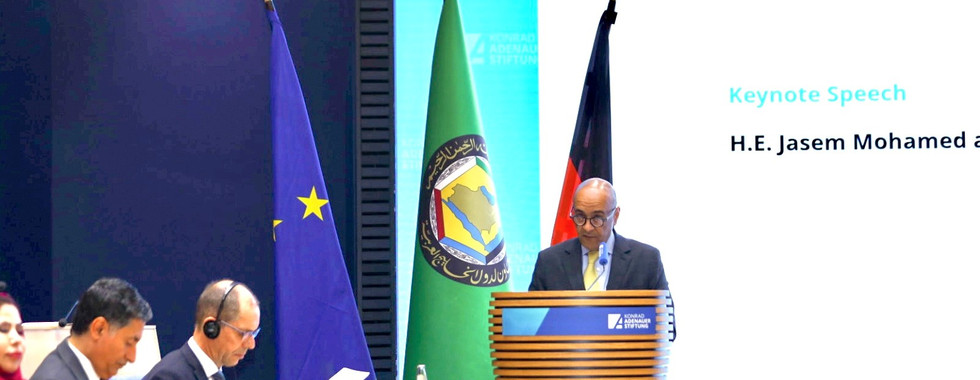The German foreign policy is still undergoing a partial redirection following what is referred to as the "turning point." On June 14, 2023, the federal government also decided to establish the first national security strategy. Against this backdrop, relations between Germany or the European Union and the Arab Gulf countries are of great importance. The awareness of meeting Gulf countries as equal international partners is increasingly entrenched in political consciousness. In various areas such as regional stability and security, as well as cooperation in economic and energy policies, both sides rely on each other more than ever, making dialogue sincere and open about common ground, interests, challenges, or points of contention necessary. The "German-Arab Gulf Dialogue on Security and Cooperation" was organized in 2019 by DAFG - German-Arab Friendship Association, in cooperation with the Konrad Adenauer Foundation (KAS) and in collaboration with the Federal Academy for Security Policy (BAKS). This year, it took place on June 19 and 20, 2023, in Berlin for the fifth time.
This established and unique forum once again brought together numerous high-level political decision-makers, such as the Secretary-General of the Gulf Cooperation Council, His Excellency Jassim Mohammed Al-Badawi, Nils Annen, Parliamentary State Secretary at the Federal Ministry for Economic Cooperation and Development (BMZ), and the Honorary Chairman of the Conference, His Royal Highness Prince Turki Al-Faisal. The conference has proven itself as a unique platform for discussion in Germany. This year, for the first time, the agenda included exchanges between parliamentarians from the Gulf Cooperation Council countries and Germany, in addition to a youth forum for young scholars and professionals.
Year after year, discussions and conversations within the "German-Arab Gulf Dialogue" provide an assessment of the current state of relations between Germany and the European Union and the Arab Gulf countries. This year's forum, held at the Konrad Adenauer Foundation Academy, brought together about 230 high-level European and Arab representatives from the fields of politics, defense, and business, including members of the German Bundestag and the European Parliament. It was a special honor to welcome back the Honorary Chairman of the Conference, His Royal Highness Prince Turki Al-Faisal, President of the King Faisal Center for Research and Islamic Studies, to Berlin. Participants this year once again included many Arab ambassadors and diplomats, as well as business representatives from the region.
A Partnership Built on Common Strategic Interests -
The first day of the conference on June 19, 2023, began with greetings from Dr. Gerhard Wahlers, Deputy Secretary-General of KAS and Head of European and International Cooperation, and President of DAFG Dr. Otto Wiesheu, and BAKS President Ambassador Eikehardt Broß, and the Dean of the Arab Ambassadors Council in Germany and Ambassador of the Lebanese Republic, His Excellency Mustafa Adib. The thematic framework for subsequent discussion sessions was set by the keynote speeches delivered by the Secretary-General of the Gulf Cooperation Council, His Excellency Jassim Mohammed Al-Badawi, and Dr. Nils Annen.
In his speech, His Excellency Jassim Mohammed Al-Badawi emphasized that, amid global challenges and changes, enhancing cooperation and coordination in the fields of security and foreign policy between the Arab Gulf countries and the Federal Republic of Germany is essential. GCC countries and Germany will have strong, long-term friendly relations, in addition to broad trade and investment ties. It is important to expand relations in the fields of education, research, vocational training, artificial intelligence, and cybersecurity. He pointed out the significant developments in the Gulf countries and explained that Germany's strong role in foreign and security policy in the region is desirable.
Nils Annen emphasized that the "German-Arab Gulf Dialogue" plays an extremely important role as a forum for personal exchange and building mutual trust, especially after the pandemic. The Gulf Cooperation Council region has now become established as an important global player. Even against the backdrop of the new national security strategy, Germany looks at countries as strategic partners, as highlighted by the numerous visits by the Chancellor and German ministers to the region. In this context, partnership on an equal footing and the resulting sincere dialogue are highly valuable for both sides. This also includes the German side being more responsive to its partners and taking their perspectives seriously. In the future, it is important to expand exchanges to increase mutual trust. The upcoming United Nations Climate Change Conference (COP28) in Dubai should provide another opportunity to shape a common future together.
- Expanding Cooperation between the European Union and the Gulf Cooperation Council (GCC) -
Within the first discussion session titled "Common Agenda for EU-GCC Cooperation," chaired by Dr. [Name], the seminar, moderated by Canan Atilgan, focused on the relationship between Europe and the Gulf Cooperation Council. Nils Annen, Dr. [Name], Johan Wadephul, and others attended the conference. During the discussion, His Royal Highness Prince Turki Al-Faisal emphasized that Germany should play a leading role in expanding relations between the Gulf Cooperation Council countries and the European Union, ultimately implementing the free trade agreement. Relations between the GCC countries and the EU are of great importance in the region. The diplomatic rapprochement between Saudi Arabia and Iran was described as a significant geopolitical change that sets standards for other actors in the region.
The Secretary-General of the Gulf Cooperation Council noted that relations between Germany and the GCC are continuously evolving and improving, with mutual acceptance and equal dialogue being crucial. Nils Annen stressed that Germany needs to better empathize with its partners from the GCC. Partnership provides significant opportunities for both sides that should be seized. According to Sheikh Thamer Al-Sabah, both sides need to accept and understand each other and their interests better through open dialogue. He also pointed out the sometimes prevailing "double standards" when European countries look at wars and conflicts. Dr. [Name] confirmed that Germany is ready to listen to the GCC countries. Based on this, common ground, shared interests, and mutual understanding should be identified and worked upon. Finally, there was a strong German and European interest in a robust partnership with the GCC countries.
- Partnership Issues between the European Union and the Gulf Cooperation Council -
A second session, moderated by Dr. [Name] from the American University in Kuwait, discussed partnership issues between the European Union and the Gulf Cooperation Council. Antonio Lopez-Isturiz White, Jürgen Trittin, Dr. [Name], Sheikh Mohammed bin Abdullah bin Hamad Al-Harthy, and Abdullah Abdullatif Al Sheikh Abdullah participated in the discussion. The session focused on new opportunities and challenges related to mutual cooperation.
- Regional Security Cooperation in a Changing Global Situation -
The first discussion round, titled "Alliance Shifts in the Gulf and Regional Security Cooperation," highlighted political and security issues. The discussion was led by Bernd Motschleb, and participants included Hazza Al-Qahtani, Hatim Al-Tai, Dr. Abdul Khaleq Abdullah, Ambassador Eikehard Bros, and Dr. Cinzia Bianco. Topics included the German national security strategy, the so-called "turning point," and their impact on security and foreign policy in the region. The increasing importance of Gulf Cooperation Council countries in global politics was emphasized.
Concrete steps for expanding security and foreign policy cooperation were discussed in a subsequent panel moderated by Abdullah Al-Janad. Participants included Brigadier Nasser Al-Zadjali, Sheikha Najla Al-Qasimi, Dr. Mohammed Al-Sulami, and Members of the Bundestag Laila Qadour and Alexander Radwan.
- Developmental Cooperation and Humanitarian Aid:
The final session of the day, titled "Unity in Developmental Cooperation and Humanitarian Aid," focused on opportunities to expand cooperation in developmental and humanitarian aid. Gulf countries play a significant role in both areas, and it was an honor to welcome representatives from the King Salman Center for Relief and Humanitarian Works, Germany, and other key players. Dr. Samer Al-Jatili, the spokesperson for the King Salman Center, highlighted the important work done by various organizations.
At the reception held at the end of the first day, participants had the opportunity to continue dialogue and establish new networks after key speeches by Professor Dr. Norbert Lammert, the President of KAS, and Prince Turki Al Faisal. Prince Turki emphasized the need for increased trust among regional players and the importance of ongoing efforts for progress in the Middle East.
- Cooperation in Economic Policy and Energy:
The second day of the conference focused on cooperation in economic policy and energy. Discussions included industrial cooperation, investment, industrial diversification, and artificial intelligence. The session on "Launching Economic Cooperation Potentials" involved key figures from Germany, Saudi Arabia, and the UAE, discussing various aspects of economic collaboration.
The second session, titled "Empowering the Future – Opportunities for Transformation and Cooperation in Energy," covered topics such as energy policy, energy security, renewable energy, and hydrogen production. The upcoming COP28 climate conference in the UAE was also a significant topic. The discussions involved speakers from Germany, the UAE, and Lebanon, addressing climate diplomacy and international responses.
- German-Gulf Youth Forum:
For the first time, the conference featured the "German-Gulf Arab Youth Dialogue," providing young scholars and professionals from Germany and the Gulf the opportunity to exchange ideas in three thematic sessions. The forum aimed to create networks based on mutual understanding and was moderated by Robin Juliano, a journalist and podcast host.
- The Conference as a Forum for "Real Dialogue":
Dr. Christian Buck, Head of Political Department 3 at the German Ministry of Foreign Affairs, referred to the conference as a forum for "real dialogue" between Germany and the Gulf. The Gulf Cooperation Council countries provide ample space for direct exchange and mutual listening, evolving into global actors in a short period. Discussions indicated a willingness on both sides to move forward as partners. The "German-Gulf Arab Dialogue" was identified as the appropriate platform to continue and expand this partnership in the future.
The organizers expressed gratitude to all participants, cooperation partners, and the honorary president for emphasizing the need to continue and enhance the conference and dialogue in the coming year.
Gulf-German Dialogue Conference / German-Gulf Cooperation File
European Organization for Diplomatic and Economic Policies / Geneva Center for Studies



























































コメント